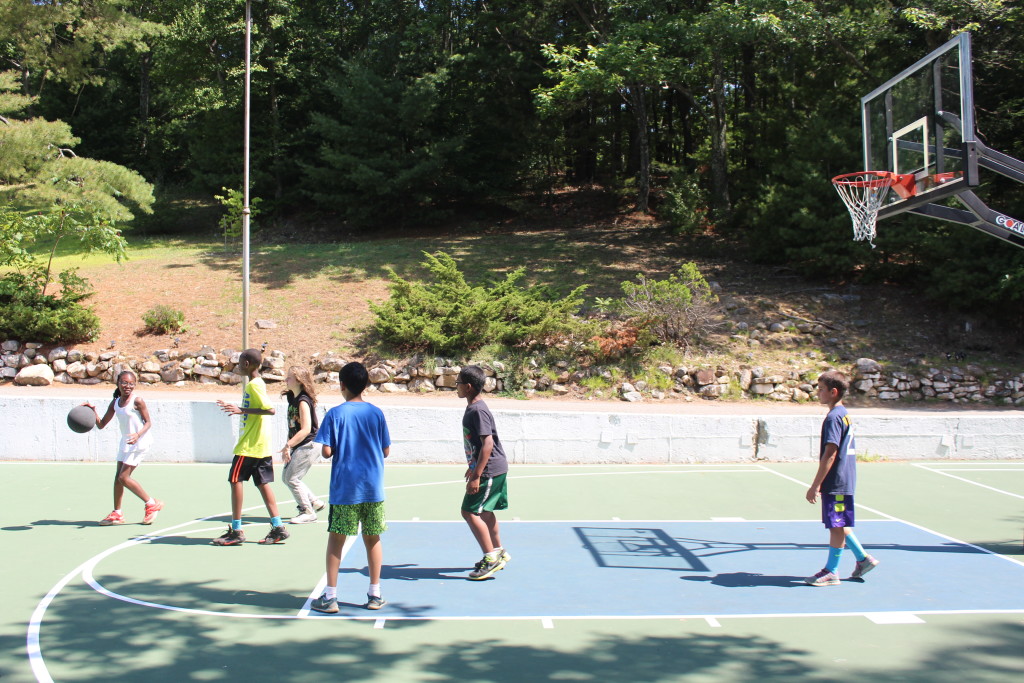We had a splendid time celebrating 50 days until Greenwood Trails and now, it’s time to start mentally preparing your camper for their time at camp.
Chris Thurber wrote this great article for first time camper parents.
Preventable Suffering
Turner, the Junior Division Head, had been sitting with eleven-year-old Robin at the foot of the big elm tree for nearly an hour. He’d pleaded with Robin to give camp a try, begged him to return to the kickball game — now in its final inning — and promised to be Robin’s buddy at afternoon swim. No surprise that the intensity of Robin’s homesickness had only become greater and his resolve to return home stronger. No surprise, because Turner had never received specific training in coaching homesick campers, Robin had never received specific training in coping with normal feelings of homesickness, and Robin’s parents had never been advised on the best ways to prepare him for camp. In fact, their parting words on opening day were, “Don’t worry, sweetheart. If you feel homesick, we’ll come and get you.”
The bad news: Protracted conversations, counterproductive advice, pick-up deals, and emotional suffering are common at camps around the world. The good news: It’s all preventable. A well-designed prevention program can reduce the intensity of first-year campers’ homesickness by 50 percent or more, virtually eliminate parent pick-up deals, and give staff the tools they need to provide prompt, sensitive, and effective support.
Prevention Science
What is “a well-designed prevention program?” First of all, it’s a program that happens before opening day. Anything that happens after opening day, such as sitting down and coaching a homesick camper, is treatment. Treatment is important, and your staff should know how to recognize and treat homesickness, but 70 percent of what causes homesickness exists before camp starts. Homesickness risk factors include:
- little previous experience away from home, including little or no previous camp experience
- negative attitudes about camp and the separation from home, including feeling forced to go to camp
- high levels of parental anxiety expressed to prospective campers, including ambivalent statements such as, “Have a great time at camp. I don’t know what I’ll do without you”
- expectations of intense homesickness, based partly on insufficient understanding of the most effective ways to cope with normal feelings of missing home
- insecure attachment, meaning uncertainty about how reliably and positively adult caregivers will behave, especially in times of need
The next thing a well-designed prevention program does is address all of these risk factors, preferably in multiple, entertaining ways. Thus, it may include:
- advice on practice time away from home, such as spending the weekend (without parents) at a relative’s house
- camp orientation materials, including colorful images of a typical day and a copy of the daily schedule
- coaching for parents on the best ways to involve their child in the decision to attend camp, as well as in camp preparation, such as shopping and packing
- coaching for parents on the best ways to prepare their child emotionally for the separation from home, including not making pick-up deals and sharing anxiety only with other adults
- educating children about the normalcy of missing home and teaching them the most effective coping strategies for in-camp homesickness
- providing information about the caring camp culture and all the ways your staff provide warm supports and exciting opportunities
If provided in a succinct, educational package, a well-designed prevention program works to promote adjustment and minimize homesickness intensity because it:
- bolsters confidence, through experiential learning (e.g., practice time away from home)
- reduces anxiety, through novelty reduction (e.g., orientation about living at camp)
- increases competence, through skill acquisition (e.g., how to cope with homesickness)
- supports families, through personal attention (e.g., coaching parents and children about camp culture)
- enhances positive attitudes, through illustration (e.g., showing how much fun camp is)
- boosts feelings of control, through participation (e.g., choosing a camp together, as a family)
Predicting Homesickness
Homesickness prevention works because homesickness itself can be predicted. One can scientifically assess all of the risk factors a given child has, such as negative expectations about camp and little previous experience away from home, but the single most accurate predictors are children themselves. If you ask children, one month prior to camp, to guess the intensity of their in-camp homesickness on a scale from 0 to 10, they come within a point or two of their actual average two-week intensity!
That may seem remarkable, until you realize what a powerful effect attitudes have on emotions. Quite simply, children and adolescents who believe they will become severely homesick will often become severely homesick. Now take a step back and ask, “Why do young people believe they will become severely homesick in the first place?” It’s more complicated than the old “self- fulfilling prophecy” hypothesis.
Instead, the answer circles back to the familiar targets for prevention: control, confidence, coping, and contact. If one or more of these constructs lacks strength, the likelihood of intense homesickness increases. Children know when they lack coping skills; they perceive diminished control over their futures; they sense the absence of meaningful camp contact; and they feel their confidence drop. This is why they can so accurately predict their own future adjustment to separation.
Each of the constructs in Figure 1 re-quires precamp contact with new camper families. Each requires explicit instruction. When contact and instruction are absent, the results are inevitable. For example, I often receive summer consultation calls from exasperated camp directors who are looking for solutions to intractable cases of homesickness. By the time I get called, the director has already considered sending the camper home early. My first question is always: “Has a pick-up deal been made?” Once I know whether that camper’s parents have promised to pick him up if he felt homesick, I have a clearer sense of how to manage the case.
Pick-Up Deals
In cases where a pick-up deal has been made (and children tend to reveal this more candidly than sheepish parents do), there are two equally unsatisfactory alternatives:
- Advise the parents to stick to their word and pick the child up early. The disadvantage here is that the child is robbed of the opportunity to complete his camp stay; or
- Advise the parents to rescind their promise and insist the child stay at camp. The disadvantage here is that the child’s trust of his or her parents is eroded.
At this point, the camp director I’m talking with usually asks the question most people ask when faced with two crummy choices: “How could I have prevented this?” Specifically — and most congruent with a philosophy of partnering with parents — they ask the question: “What do I need to say to parents to get them to stop making pick-up deals?”
My answer is embarrassingly simple. “You just have to tell them not to make pick-up deals,” I insist, adding “Give them the rationale, of course, but do it all before opening day.” This straightforward approach makes sense to directors facing a crisis, but for anyone to adopt this approach now, during the off-season calm before the storm, requires surmounting two small psychological hurdles: (1) Overcoming the fear of broaching the topic of homesickness with families; and (2) Understanding the subtext of parents’ anxiety. Until camp directors overcome these two hurdles, they are destined to encounter multiple homesickness crises each summer.
Discussing Homesickness
In 1995, I conducted a study to address a concern that camp directors, parents, and even my doctoral dissertation committee (!) had about my research on homesickness. Wasn’t my asking campers to rate their daily homesickness intensity (along with the daily intensity of their happiness and other emotions) actually causing homesickness? To test this unlikely hypothesis, I compared three groups of several hundred children. Group 1 completed my Rate Your Day mood checklist just twice in two weeks; Group 2 completed it daily for 14 days; and Group 3 completed it daily for 28 days. The groups were equalized with respect to age range, experience with camp, and attitudes about camp.
The result: No differences in homesickness intensity. My conclusion: Discussing homesickness does not make it happen. To the contrary, talking about homesickness labels the feeling, normalizes it, and puts everyone in a better position to deal with it. I’m not suggesting that homesickness be the centerpiece of anyone’s conversations about camp. Ruminate about anything long enough, and it will put you in a funk. But I am suggesting that all camp professionals and new camper families deal directly with the issue in a mature, measured, rational fashion. Homesickness can no longer be the elephant in the room that everyone recognizes but fears mentioning.
As for understanding the subtext of parents’ anxiety, camp professionals must also come to a consensus that partnering with parents requires empathy. When parents respond to their children’s developmentally appropriate query “What if I feel homesick?” with the destructive promise “If you feel homesick, I’ll come and get you,” you need to amp up your empathy. You must understand that what the parents are actually saying is, “Junior, I have so little confidence in your ability to cope with this normal feeling that I think the only solution is for me to come and rescue you.” Nothing could more effectively undermine campers’ adjustment. And nothing could more clearly indicate intense parental anxiety. Once you see the anxious corner some parents inadvertently talk themselves (and their children) into, you’ll naturally be inclined to provide reassurance.
When we reassure nervous families that homesickness is normal and give them encouraging guidance on the best ways to prepare for the transition from camp to home, they listen. When we sensitively but explicitly counsel parents not to make pick-up deals, they resist the temptation. And when we measure the effects of a well-designed homesickness prevention program, the results are clear.
Yes! Prevention Works!
Homesickness is painful, it interferes with having fun at camp, and it consumes more staff hours than any other single camper issue. Children who experience moderate or severe levels of homesickness are also less likely to return to your camp, so homesickness prevention is also smart business. (In the latest American Camp Association member survey, nearly 40 percent of camps say they have not reached enrollment capacity for years.) Fortunately for all camps — day or resident — prevention science works.
The camps that have adopted a multimodal approach to homesickness prevention all report happier campers, calmer parents, higher enrollment, better retention rates, and a highly competent and confident staff who spend much more time playing and leading than treating homesickness.
Yes, Treatment Counts, Too
Of course, role-playing homesickness treatment techniques remains a staple of staff training week. A well-trained staff is part of an effective prevention program because their work with campers after opening day often prevents mild homesickness from worsening. But well-designed prevention programs that reach families long before opening day will make melodramas like Turner and Robin’s a thing of the past.
Someday, each one of the millions of children who leave home for camp will do so confidently, knowing that missing home is normal, and they will be fully prepared to implement the most effective coping skills so that homesickness doesn’t interfere with the fun that you have worked so hard to design.

